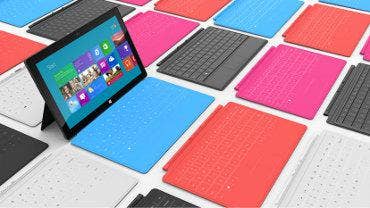Microsoft Enters Tablet Arena With New 'Surface' Devices

Microsoft Monday unveiled a pair of tablet computers dubbed "Surface" in a bold move that thrusts the world's largest software company into uncharted hardware waters.
Microsoft said the tablets would be sold in Microsoft retail stores in the U.S. and through "select online Microsoft stores," but did not specifically mention plans for channel sales.
The announcement, coming after days of speculation about Microsoft's press event in Los Angeles, will put the software developer on a collision course with Apple and its popular iPad -- and possibly with Microsoft's own hardware manufacturer partners.
"It embodies hardware and software working together," said Microsoft CEO Steve Ballmer, unveiling the new products. Emphasizing that the new Surface tablets are designed for workplace and home use, Ballmer said: "People want to work and to play. They want to be on their desk and on the go. Surface fulfills that dream."
[Related: What Windows 8 Can Do Today ]
Microsoft is introducing two tablet products: Surface for Windows 8 Pro, an Intel Core-based tablet that runs the edition of the upcoming Windows 8 operating system designed for Intel-based PCs; and Surface for Windows RT, a tablet running on ARM microprocessors.
The Surface for Windows RT tablets will be available when Windows 8 ships -- widely expected sometime this fall -- and Surface for Windows 8 Pro will be available about 90 days later.
Microsoft is counting on the tablet products to help it make up ground in the booming tablet market where the Apple iPad and tablets running Google's Android operating system dominate. While there are some tablet products running Windows 7 on the market, Microsoft has been counting heavily on Windows 8 and Windows RT to help get it into the game.
While Microsoft has generally left it to hardware partners such as Samsung and Lenovo to build hardware to run Microsoft software, Microsoft apparently decided that it needed to move on its own to become a tablet market player.
NEXT: Microsoft Tablets Pit Company Against Partners
That move, however, carries risks, noted Michael Cusumano, professor of management and engineering systems at MIT's Sloan School of Management. Launching its own tablet could dangerously pit Microsoft against its own OEM partners, which have already invested heavily in hardware for Windows RT.
"Personally, I don't think it's a good idea because it creates a conflict with [Microsoft's] partners," Cusumano told CRN. "It's a big risk for Microsoft."
He also pointed to the software giant's mixed track record in developing its own hardware. While the Xbox game controller has been a success, its homegrown Zune MP3 player never gained the traction it needed to compete seriously against Apple's iPod and quickly fizzled out.
That said, Cusumano added, Microsoft could be taking a cue from Apple, which employs a more be-all, do-all model by producing both its hardware and software platforms in-house. "Microsoft may have realized they were out-innovated by Apple," Cusumano said. "But Apple made sure the whole is greater than the sum of its parts."
Microsoft seemed to bear out that view: In its press materials for the tablets, Microsoft said the new products were "conceived, designed and engineered entirely by Microsoft employees," making it clear that this was a Microsoft project from beginning to end.
Other factors that will determine whether the surface tablets succeed or fail will include the number of third-party applications Microsoft can attract to Windows RT and the Surface tablets' price tags.
Microsoft said it would disclose suggested retail pricing at a date closer to the products' availability. But the company said pricing would be "competitive with a comparable ARM tablet or Intel Ultrabook-class PC." Microsoft also said "OEMs will have cost and feature parity on Windows 8 and Windows RT."
The Surface tablets sport a 10.6-inch touch display, a built-in keyboard and a built-in "kickstand." The casing is manufactured using a process Microsoft calls "Vapor-Mag." Surface for Windows RT weighs 676 grams while Surface for Windows 8 Pro weighs 903 grams.
A video and photo gallery showing the details of the Surface tablets is available here.
Kristin Bent contributed to this story.